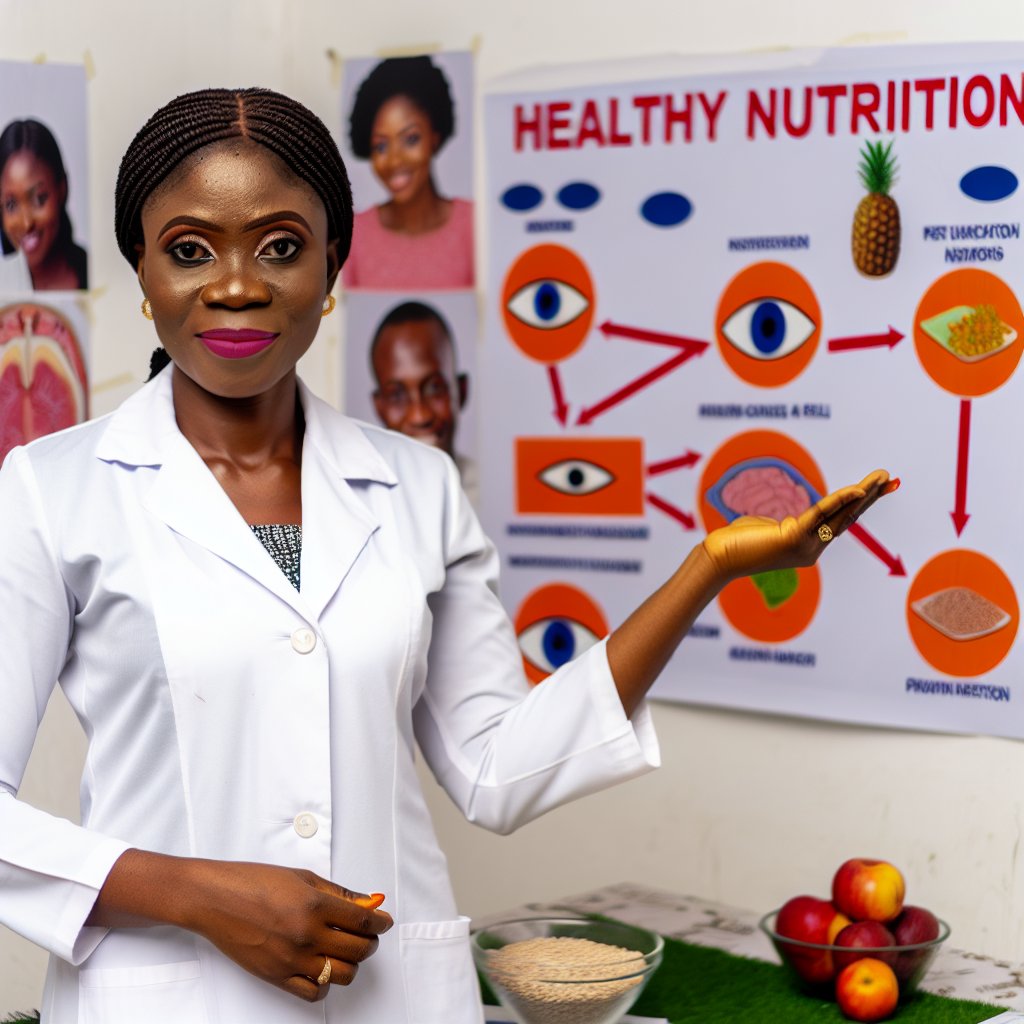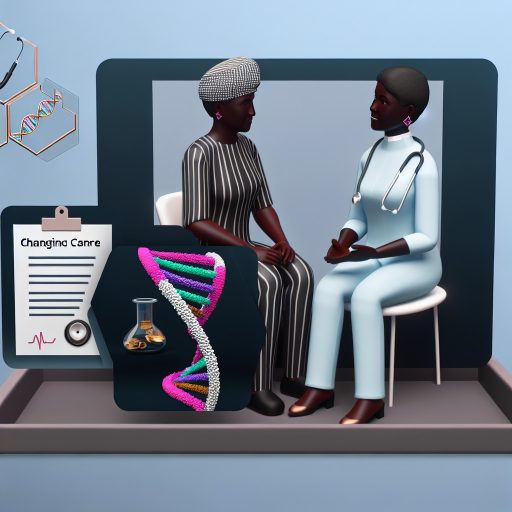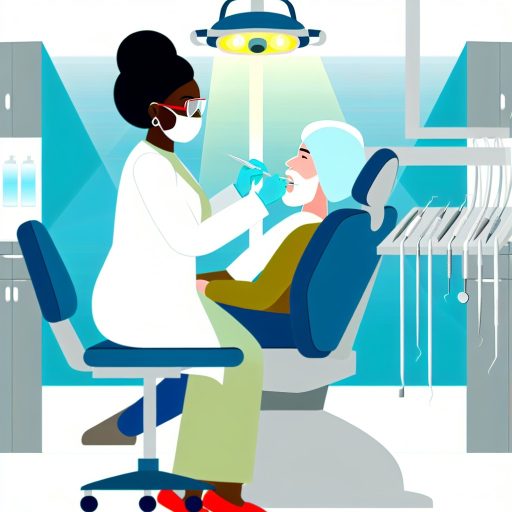Introduction:
Eye health is crucial for overall well-being.
In Nigeria, the prevalence of eye diseases is a growing concern.
The role of diet in maintaining good eye health cannot be overestimated.
The role of nutrients in maintaining eye health:
Vitamins A, C, and E are crucial for preventing eye diseases.
Antioxidants play a key role in protecting the eyes from damage.
Foods rich in these nutrients include carrots, oranges, almonds, spinach, and avocado.
Vitamin A:
Vitamin A is essential for maintaining good vision and overall eye health.
It helps in the formation of a light-sensitive pigment in the retina called rhodopsin, which is necessary for night vision.
Deficiency in Vitamin A can lead to night blindness and other serious eye conditions.
Foods rich in Vitamin A include carrots, sweet potatoes, and spinach.
Vitamin C:
Vitamin C is a powerful antioxidant that helps protect the eyes from oxidative stress and inflammation.
It also promotes the health of blood vessels in the eyes.
Including Vitamin C-rich foods like oranges, strawberries, and bell peppers in your diet can lower the risk of age-related macular degeneration and cataracts.
Vitamin E:
Vitamin E is another antioxidant that plays a crucial role in maintaining eye health.
It helps protect the cells in the eyes from damage caused by free radicals.
Nuts like almonds and sunflower seeds, as well as green leafy vegetables like spinach, are excellent sources of Vitamin E that can benefit your eyes.
Essential Nutrients for Eye Health:
Ensuring a diet rich in essential nutrients like Vitamins A, C, and E is vital for maintaining optimal eye health and preventing eye diseases.
By incorporating foods that are abundant in these nutrients into your daily meals, you can protect your eyes and keep your vision sharp for years to come.
Common eye diseases in Nigeria:
- Identify prevalent eye conditions such as cataracts, glaucoma, and age-related macular degeneration.
- Explain how poor diet can contribute to the development of these diseases.
- Share statistics on the prevalence of these eye conditions in Nigeria.
Cataracts:
Cataracts are a common eye condition in Nigeria, affecting many individuals as they age.
A poor diet lacking in essential nutrients like vitamins C and E can contribute to the development of cataracts.
Studies have shown that a diet rich in antioxidants can help prevent or slow down the progression of cataracts.
According to statistics, cataracts account for a significant percentage of vision impairment cases in Nigeria.
Glaucoma:
Glaucoma is another prevalent eye disease in Nigeria, often referred to as the “silent thief of sight.”
Poor dietary habits, especially high salt intake, can increase the risk of developing glaucoma.
A diet high in fruits, vegetables, and omega-3 fatty acids can help reduce the risk of glaucoma.
In Nigeria, glaucoma is a leading cause of irreversible blindness, affecting a considerable percentage of the population.
Age-related macular degeneration (AMD):
AMD is a progressive eye disease that affects the macula, leading to central vision loss.
Poor diet choices, such as consuming excessive saturated fats and processed foods, can accelerate the development of AMD.
Including foods rich in antioxidants, zinc, and lutein in the diet can help prevent or slow down AMD progression.
Reports indicate an increasing prevalence of AMD in Nigeria, particularly among the elderly population.
Impact of Diet on Eye Health:
Common eye diseases like cataracts, glaucoma, and age-related macular degeneration are prevalent in Nigeria, affecting a significant portion of the population.
Poor dietary habits play a crucial role in the development and progression of these eye conditions.
By adopting a healthy and balanced diet rich in nutrients and antioxidants, individuals can reduce their risk of developing these sight-threatening diseases.
Explore Further: Anatomical Pathology Residency Programs in Nigeria
Traditional Nigerian Diet and its Impact on Eye Health
Nigeria is a country rich in diverse cultures and traditions.
Its vibrant cuisine reflects this diversity.
The traditional Nigerian diet consists of staple foods like rice, yam, plantains, beans, and vegetables.
Additionally, traditional dishes such as jollof rice, pounded yam, egusi soup, and suya are commonly enjoyed across the country.
Analysis of the Traditional Diet for Eye Health
-
The traditional Nigerian diet, while flavorful and varied, may lack certain essential nutrients crucial for maintaining good eye health.
-
One of the key nutrients often deficient in the Nigerian diet is Omega-3 fatty acids.
-
These fatty acids play a vital role in protecting the eyes from conditions like dry eyes and macular degeneration.
-
Another nutrient that may be insufficient in the traditional Nigerian diet is Lutein.
-
This carotenoid helps filter harmful blue light and protects the eyes from damage.
-
Deficiencies in important vitamins like Vitamin A, C, and E can also impact eye health.
-
These deficiencies can lead to issues such as poor night vision, cataracts, and age-related macular degeneration.
Suggestions for Incorporating Eye-Healthy Foods into the Nigerian Diet
-
Introducing more leafy green vegetables like spinach, kale, and collard greens into traditional dishes can provide a rich source of Lutein and other essential nutrients for eye health.
-
Incorporating foods high in Omega-3 fatty acids such as fish, flaxseeds, and walnuts can help bridge the gap in the Nigerian diet and support overall eye health.
-
Consuming Vitamin A-rich foods like carrots, sweet potatoes, and red bell peppers can boost eye health and protect against night blindness and other vision problems.
-
Adding Vitamin C-rich fruits like oranges, strawberries, and guavas to daily meals can help maintain healthy blood vessels in the eyes and reduce the risk of developing cataracts.
-
Including Vitamin E sources like almonds, sunflower seeds, and avocado can further enhance eye health by protecting the eyes from oxidative stress and age-related damage.
By making these small but impactful changes to the traditional Nigerian diet, individuals can ensure they are providing their eyes with the necessary nutrients to support optimal vision.
These adjustments can help prevent eye-related complications in the long run.
Transform Your Career with Expert Guidance
Get personalized mentorship consulting that’s tailored to your unique path. Our expert advice is actionable and exclusive.
Get StartedDelve into the Subject: How Physiotherapy Can Improve Nigerian Lives
Modern Dietary Trends in Nigeria
When it comes to modern dietary trends in Nigeria, there has been a noticeable shift towards the consumption of Western fast food chains and processed foods.
These foods are often high in sugar, salt, and trans fats, which can have a negative impact on eye health.
The Influence of Western Fast Food Chains
Western fast food chains have become increasingly popular in Nigeria, especially among the younger population.
These foods are convenient and affordable, making them a go-to option for many people.
However, the high levels of sugar, salt, and trans fats in these foods can contribute to various eye health issues.
The Impact of High Sugar, Salt, and Trans Fat Consumption on Eye Health
High sugar consumption has been linked to an increased risk of developing diabetic retinopathy, a condition that can cause vision loss.
Excessive salt intake can lead to high blood pressure, which in turn can negatively affect eye health.
Trans fats, commonly found in processed foods, have been associated with an increased risk of developing age-related macular degeneration, a leading cause of blindness in older adults.
Tips for Making Healthier Food Choices
To maintain good eye health in the face of modern dietary trends, it is important to make healthier food choices.
Here are some tips to help you make better decisions:
- Opt for whole foods over processed foods whenever possible.
- Include a variety of fruits and vegetables in your diet, as they are rich in antioxidants that can help protect your eyes.
- Choose lean protein sources such as fish, poultry, and legumes.
- Limit your intake of foods high in sugar, salt, and trans fats.
- Drink plenty of water to stay hydrated and maintain good overall health.
- Consult a nutritionist or dietitian for personalized dietary advice tailored to your individual needs.
By following these tips and making conscious choices about what you eat, you can help support your eye health and overall well-being in the long run.
Remember, a balanced and nutritious diet is key to maintaining good vision and preventing eye-related problems down the line.
See Related Content: Oral Health Education in Nigerian Schools

Importance of Hydration for Eye Health
Hydration is crucial for maintaining good eye health because it helps keep the eyes moist.
This prevents dryness and discomfort from occurring in the eyes.
Dehydration can lead to dry eyes, irritation, and even blurred vision.
To stay adequately hydrated, drink at least 8-10 glasses of water daily.
In addition, include hydrating foods like fruits and vegetables in your diet.
Avoid excessive caffeine and alcohol intake, as they can dehydrate the body.
Set reminders or use phone apps to track your water intake throughout the day.
Finally, carry a reusable water bottle with you to ensure easy access to water.
- Water helps in keeping the eyes moist.
- Dehydration can lead to dry eyes, irritation, and blurred vision.
- Drink at least 8-10 glasses of water daily.
- Include hydrating foods in your diet.
- Avoid excessive caffeine and alcohol intake.
- Set reminders to track your water intake.
- Carry a reusable water bottle for easy access.
Explore Further: Preventive Dentistry: Managing Dental Anxiety
Cultural Beliefs and Practices Related to Eye Health in Nigeria
One of the fascinating aspects of Nigerian culture is the deep-rooted beliefs and practices surrounding eye health.
Let’s delve into some traditional remedies and superstitions that have prevailed over the years.
Examination of Traditional Remedies and Superstitions
- Many Nigerians still rely on traditional healers for eye ailments, using herbs and concoctions.
- Some believe that placing raw slices of cucumber over the eyes can improve vision.
- There is a prevalent belief in the “evil eye” causing harm to one’s vision.
- Using charms or amulets to ward off evil spirits that are thought to cause eye diseases.
- Some traditional practices involve placing drops of breast milk in the eyes.
Misconceptions about Eye Health and Diet in Nigerian Culture
- One common misconception is that eating a lot of carrots alone can drastically improve eyesight.
- Another myth is that staring directly at the sun can strengthen the eyes.
- Many Nigerians believe that traditional remedies are more effective than modern medicine.
- Some think that wearing glasses will weaken the eyes over time, leading to dependency.
- There is a misconception that only the elderly need to be concerned about eye health.
Advocacy for Evidence-Based Practices and Nutrition Education
- Educating the population on the importance of a balanced diet for optimal eye health.
- Promoting regular eye check-ups with trained medical professionals to prevent and detect early signs of eye diseases.
- Dispelling myths and superstitions through community outreach programs and awareness campaigns.
- Encouraging evidence-based practices that are supported by scientific research and studies.
- Advocating for nutrition education in schools and communities to emphasize the role of diet in maintaining good eye health.
By addressing these cultural beliefs and practices surrounding eye health in Nigeria, we can pave the way for improved outcomes through evidence-based practices and nutrition education.
Importance of Diet for Eye Health
Considering the impact of diet on eye health, it is clear that what we eat plays a crucial role in maintaining good vision.
A balanced and nutrient-rich diet is essential for optimal eye function, helping to prevent various eye diseases and conditions.
By making small changes to our diet, such as incorporating more fruits and vegetables rich in vitamins and antioxidants, we can support long-term eye health.
Ultimately, it is important to be mindful of what we eat and to prioritize foods that benefit our eyes to ensure continued clarity and sharp vision.
Additional Resources
Exploring health care professionals’ and women’s perspectives on …
Perinatal depression in Nigeria: perspectives of women, family …




